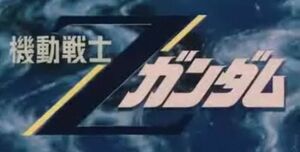Mobile Suit Zeta Gundam (機動戦士Ζガンダム Kidō Senshi Zēta Gandam) (aired 1985–1986) was a fifty-episode animeseries and a direct sequel to the original Mobile Suit Gundam. The show was written and directed by Yoshiyuki Tomino, with character designs by Yoshikazu Yasuhiko, while the series' mechanical designs were split amongst Kunio Okawara,Mamoru Nagano, and Kazumi Fujita. The series was originally aired by Nagoya Broadcasting Network (and it's sister ANN stations), rerun on the anime satellite television network, Animax, across Japan and later its respective networks worldwide, including Southeast Asia, East Asia, Latin America, and other regions.
Compilation movies: A New Translation
In celebration of Gundam's 25th anniversary (and also the 20th anniversary of Zeta Gundam), the 50-episode series was compiled into a new movie trilogy. According to Tomino, the movie series was created to fix some of the problems he identified in the Zeta TV series and to bring the 20-year-old series into a 21st century context for the new generation now experiencing the increasingly commercialized series such as Mobile Suit Gundam SEED. The first movie, "Heirs to the Stars", opened on May 28, 2005, followed by "Lovers" on October 29, 2005, and "Love is the Pulse of the Stars" on March 6, 2006. The movies were a surprising hit, and went on to make almost 2 billion yen in box office revenue in total.
The compilations digitally remastered the TV series of Zeta Gundam with new footage. 33% of the first film was remastered footage, as well as around 70% of the second. Plot details such as the Argama's visit to the colony of 30 Bunch were changed to allow the film to flow more smoothly, unlike Tomino's previous Gundam film compilations. Also, other than Haman Karn's custom-type Gaza-C, some mobile suits that belong to the period designed after the TV version are also put into the movies such as GM Quel (Gundam 0083) as well as Gundam Hazel TR-1 (Advance of Zeta)
Like the Mobile Suit Gundam movie trilogy, the majority of the original cast of Mobile Suit Zeta Gundam reprised their roles for these theatrical versions — with the exception of Satomi Arai replacing Miyuki Matsuoka as Fa Yuiry,Yukana Nogami replacing Saeko Shimazu as Four Murasame, Yuu Asakawa replacing Kayoko Fujii as Rosamia Badam, and Chizuru Ikewaki (Lovers)/Kaori Shimamura (Love is the Pulse of the Stars) replacing Yuko Mizutani asSarah Zabiarov.
One of the largest changes created by the movies is the ending, which changes the Universal Century timeline considerably by removing the Axis Zeon from the Earth Sphere. This results in the displacement of the original sequel to Zeta, ZZ Gundam, as well as the follow-up movie Char's Counterattack. In addition, as contrast to the original TV series, Kamille does not mentally break down due to Scirocco's mind-crippling attack. This change contributed greatly to the success at the box office since Gundam fans were curious about the new ending (though it is an expected ending from Tomino's previous comment on the movies).
The trilogy performed exceptionally well in the Japanese box office, far more so than previous efforts by a Gundam series as well as many high profile animated films such as Steamboy. This success is even more remarkable considering the film is shown in a more limited number of theaters than usual. Heirs to the Stars, the first film of A New Translation, came in 3rd place at the box office on its opening week, and the second film Lovers received similar success. One possibility for this startling success is the recent wave of nostalgia, which desires a return to the serious story-telling style of older anime. However, a good deal of New Translation's viewing demographic are of a younger generation, ranging from the late teens to early twenties.
Even more surprising is the rather high amount of female viewers, reaching 30% of the overall viewing audience. Although the core demographic is 20- to 32-year-old males still, many see this as a reminder of just how well crafted the original Gundam series were. Tomino himself, who had been wrought with a recent string of financially failed series, posted a personal "Thank you" to fans and casual moviegoers alike on A New Translation's official website.
In 2006, Bandai Entertainment acquired the rights to the U.S release of the Mobile Suit Zeta Gundam: A New Translation movie trilogy. The movies were released as a three-pack entitled Mobile Suit Gundam Zeta: Movie Complete Collection on July 6, 2010. The collection contains all three films on three DVDs with English subtitles and 5.1 Japanese surround sound.
http://wrecklessmediaradio.com/
http://yourearth.ca/podcasts/xml/yourearth.xml

No comments:
Post a Comment